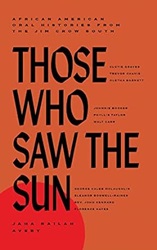
 Those Who Saw the Sun
Those Who Saw the SunAfrican American Oral Histories from the Jim Crow South
Levine Querido, 2023. 277 pages.
Review written October 30, 2023, from a copy sent to me by the publisher.
Those Who Saw the Sun is a collection of interviews with African American elders, most of whom were born during the 1940s and 1950s, and all of whom were kids in the Jim Crow era.
The book feels important – hearing the voices of people who lived through those times. It harnesses their wisdom and we get insights on the things they saw during their long lives.
I was very interested that none of the interviewees were big fans of integration. Although segregation had been harmful and unjust, they had also been part of vibrant Black communities. Outstanding Black teachers taught in their schools, even though many also mentioned they always used school books passed on after white schools had used them. Once integration happened, some Black businesses failed, and some Black teachers lost their jobs.
But it’s also true that most of the elders heard about lynchings when they were kids and other racist acts of violence. So their stories were filled with progress and hope as they witnessed great changes.
Although I think this is an important book, I wish some more helpful content was added to make it more accessible to teens and, well, to me. I would have liked a timeline for each person interviewed. Each interview started by asking where they were born, but I would have also liked to know when they were born. In an oral history, folks skip around in time, so I would have liked a scaffold to fit their remarks onto.
Some of the subjects also rambled a bit and repeated themselves. Though that does communicate their personalities, a little more editing might have increased readability. After finishing the book, I don’t really remember which person said which thing, so some commentary explaining why the order was chosen or something about the subjects in the present day – with present day pictures – might have helped it all stick in my head. It was certainly fascinating while I was reading it, though!
All the interviewees were asked, “Do you believe Dr. King’s dream is possible in this country?” Eleanor Boswell-Raine’s answer catches the spirit of what most of them said:
I think anything is possible. I like his method better than the let’s-shoot-and-kill-everybody mentality. I am definitely a nonviolent person. I really thought, though, given my age and everything, that we would almost be there by now. And so I’m deeply disappointed in terms of . . . of where we are in this country. So I want to say yes, I believe it’s possible. But I would also have to say that I doubt seriously that it will be in my lifetime.
